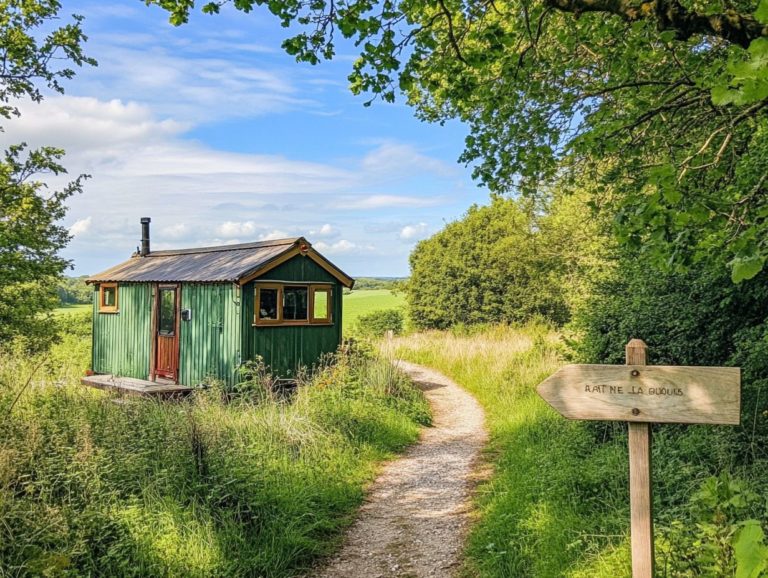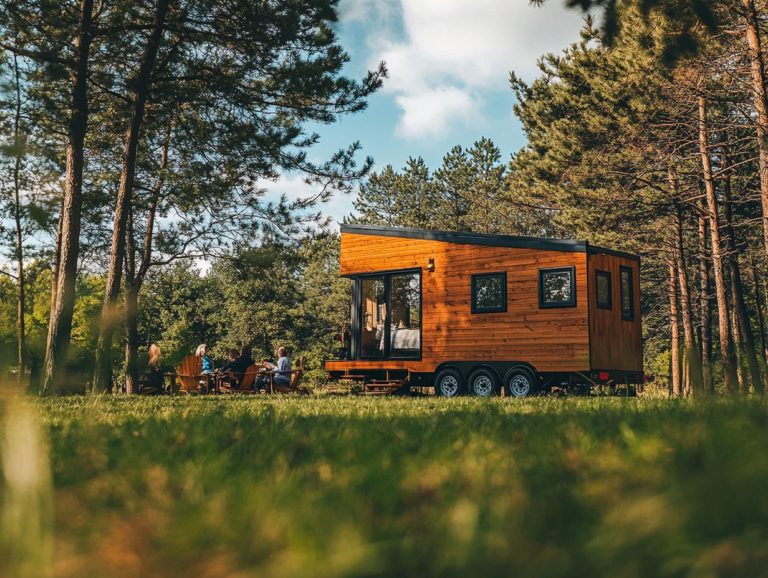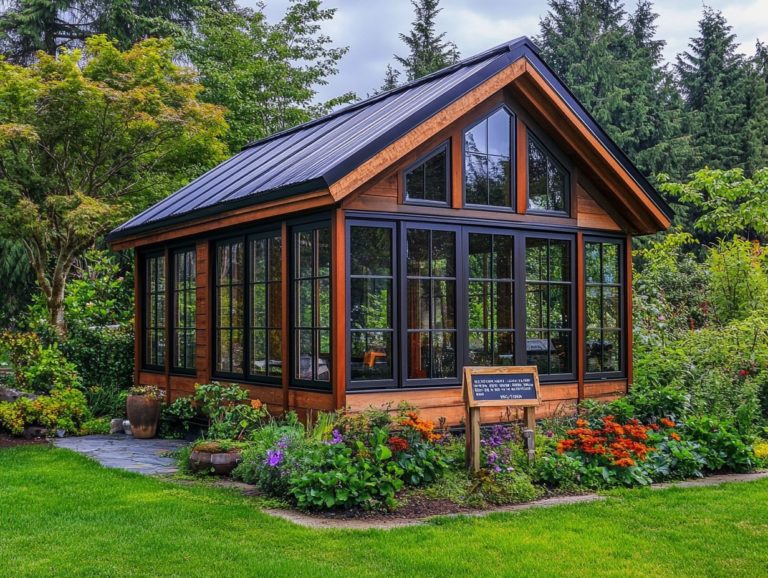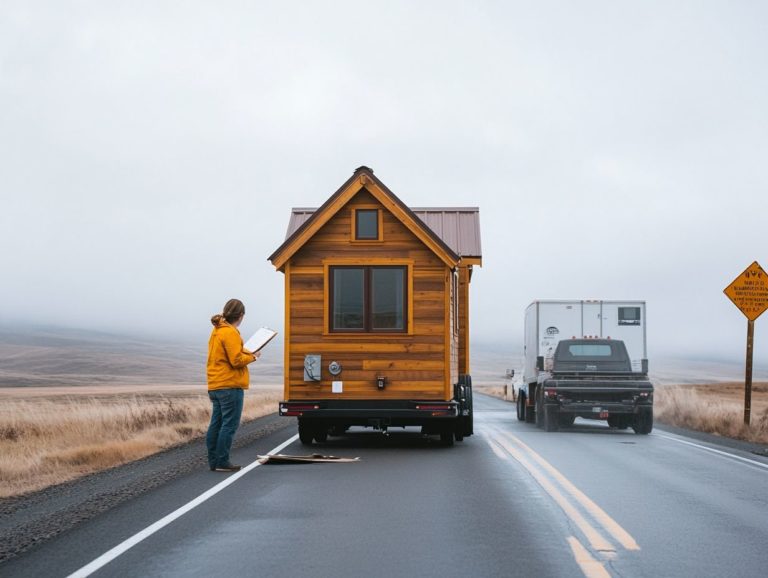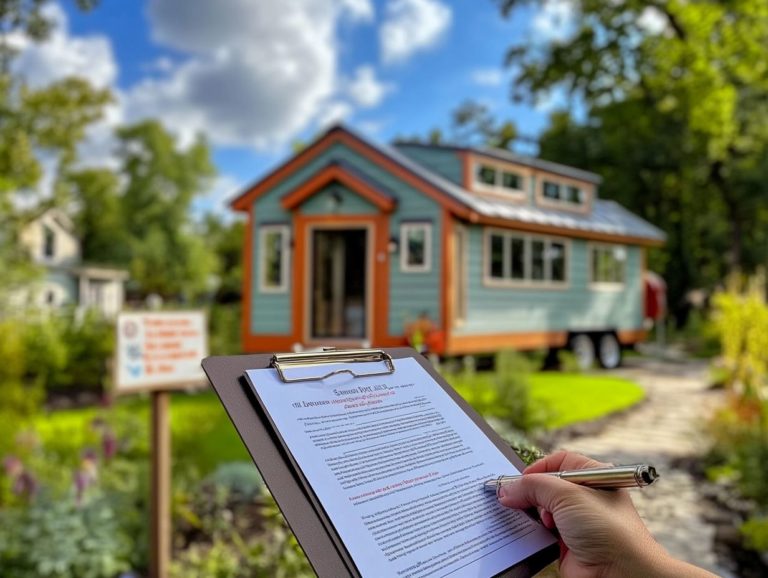Tiny House Ownership: Legal Considerations for Couples
Imagine the freedom of living in a tiny home! Tiny house living has become a popular choice for couples who crave a simpler, more intentional lifestyle.
This article explores the many benefits of tiny homes, highlighting financial savings and lifestyle enhancements. It also addresses essential legal considerations of ownership, such as zoning regulations and necessary permits, providing valuable insights to help you tackle potential challenges together.
It compares tiny houses with other living options, empowering you to make informed decisions about your future home.
Contents [hide]
- Key Takeaways:
- Benefits of Tiny House Living for Couples
- Legal Considerations for Tiny House Ownership
- Navigating Legal Challenges as a Couple
- Alternative Living Options for Couples
- Frequently Asked Questions
- 1. Is it legal for couples to own a tiny house together?
- 2. Do we need a special ownership agreement for our tiny house?
- 3. Are there zoning or building code considerations for tiny houses owned by couples?
- 4. Can one person own the land while the other owns the tiny house on it?
- 5. Can couples use a tiny house as a primary residence?
- 6. Are there any tax implications for owning a tiny house as a couple?
Key Takeaways:
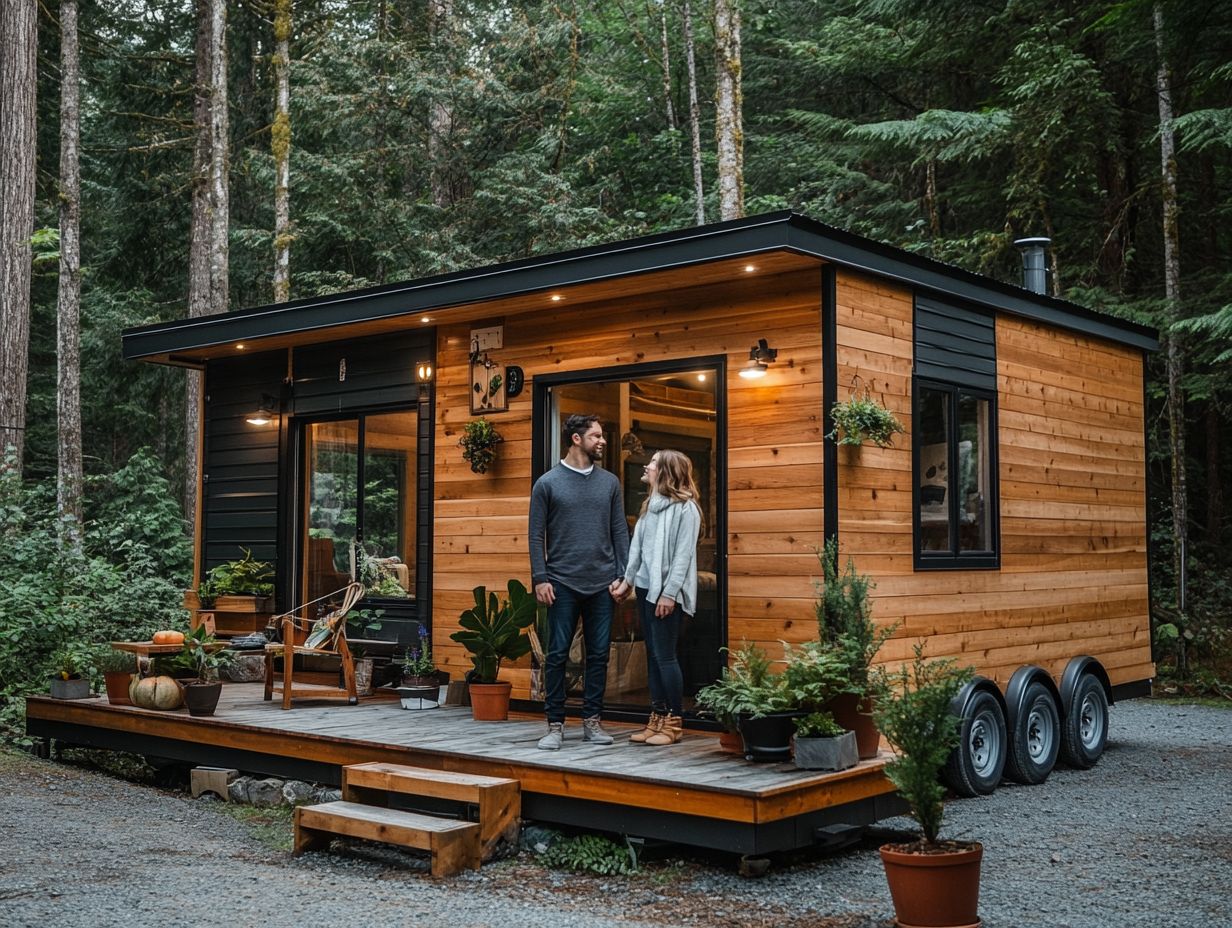
- Tiny house ownership offers financial and lifestyle benefits for couples, including reduced expenses and a simpler, more sustainable lifestyle.
- Couples considering tiny house ownership must navigate legal considerations, such as zoning and building regulations, and obtain necessary permits and licenses.
- Successfully navigating legal challenges as a couple requires effective communication and compromise, as well as exploring alternative living options beyond traditional homes.
What is a Tiny House?
A tiny house is your ticket to a more efficient and minimalist lifestyle. Typically measuring less than 400 square feet, these homes are designed to make the best use of your limited space. Many are built on wheels, allowing you to relocate easily. This trend has taken root in vibrant cities like New York City, Los Angeles, and Portland, where more individuals are embracing the tiny house movement.
With a sprinkle of creativity in design and a dash of DIY spirit, you can personalize your living space while alleviating the money worries that often accompany traditional housing.
The origins of the tiny house movement stem from a desire for simpler living, focusing on sustainability and environmental consciousness. Advocates suggest that tiny living not only reduces consumption but also fosters a stronger sense of community, as you find yourself in closer quarters with your neighbors.
This approach offers a compelling solution to the affordability crisis many face. It allows you to invest less in a home while still reaping the rewards of ownership. Skilled contractors play a crucial role in this journey, providing expertise in making the best use of your limited space and ensuring that your compact home is built to endure. Innovative design strategies, such as furniture that serves more than one purpose, elevate your tiny living experience.
Engaging in DIY projects gives you the opportunity to further customize your space while acquiring valuable skills. This journey of downsizing becomes more than just about space; it transforms into a quest for crafting your personal sanctuary.
Benefits of Tiny House Living for Couples
Living in a tiny house presents a remarkable opportunity to alleviate money worries while enhancing personal space. This ultimately fosters deeper connections and shared responsibilities in your relationship. This lifestyle not only helps you minimize moving expenses but also opens the door to the vibrant tiny house community, where you can engage with like-minded individuals who eagerly share insights and experiences from their own journeys into the world of tiny living.
Financial and Lifestyle Advantages
The financial advantages of tiny house living are substantial. By choosing this lifestyle, you can significantly cut down on mortgage or rental costs, resulting in lower overall financial stress. Opting for tiny home insurance specifically designed for these unique residences allows you to protect your investment while managing maintenance costs with ease.
This reduction in living expenses extends to utility bills, which tend to be much lower in a smaller home. Lower property taxes make tiny homes even more appealing, freeing up funds you can direct toward other pursuits, whether that’s travel or retirement.
For the savvy among you, renting out a room or space in your tiny home when it s not in use can generate extra income a game changer for financial stability. By implementing sound financial management strategies, such as effective budgeting and regular expense reviews, you can enhance your financial health and ensure you’re well-prepared for any unexpected turns.
Legal Considerations for Tiny House Ownership
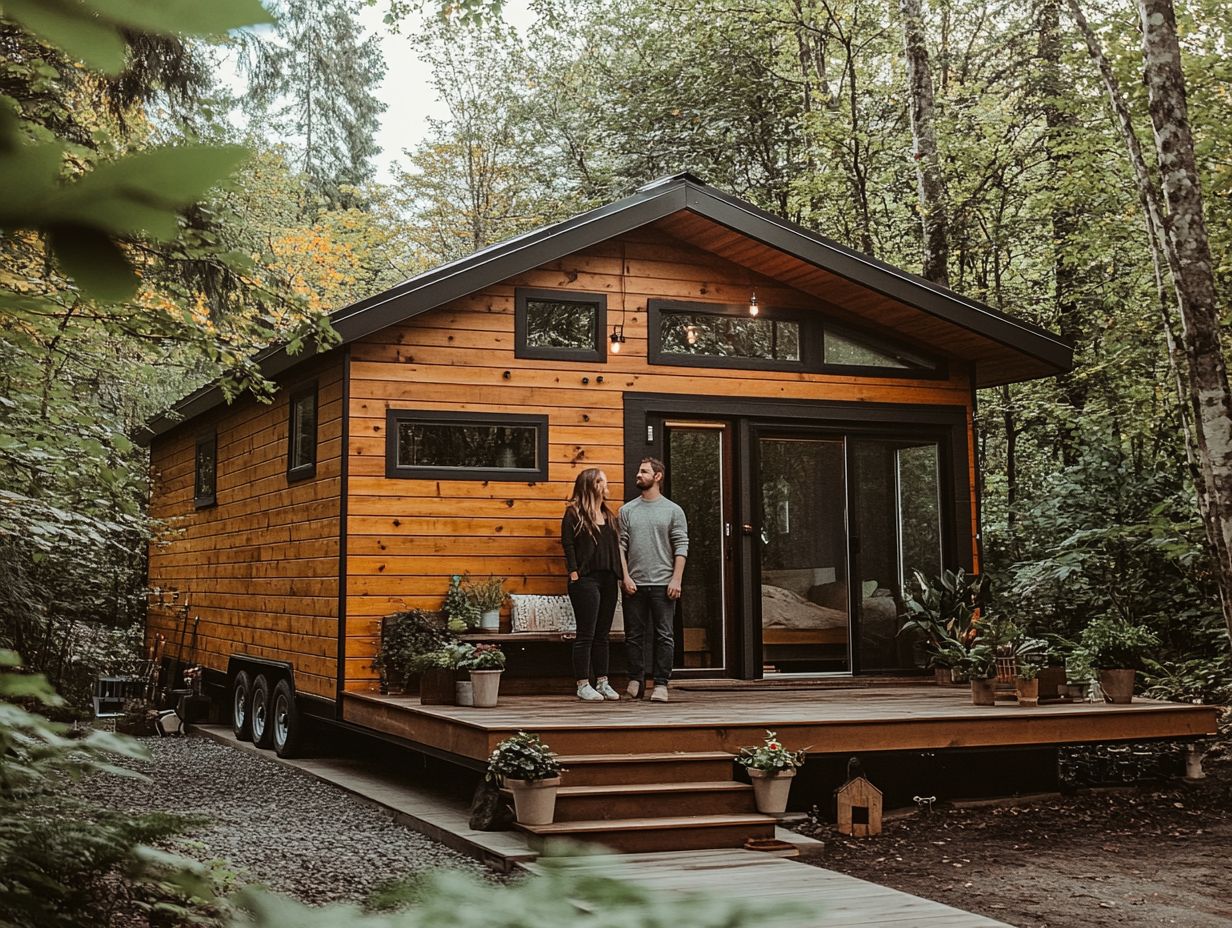
Navigating tiny house ownership can be complex. Zoning and building regulations vary widely, especially in progressive cities like Texas and California.
If you’re considering investing in a tiny home, understanding permits and licenses is key to making your tiny house dream a reality! Don’t overlook these details, as they can lead to legal complications that disrupt your vision of tiny living. For more information, check out tiny house ownership: legal rights explained.
Zoning and Building Regulations
Understanding zoning and building regulations is essential for tiny house owners. These rules dictate where and how you can place your tiny home, particularly in urban areas where space is limited.
By staying compliant with local laws, you can avoid potential fines and complications that might disrupt your tiny living experience.
Take Portland, Oregon, for example. Tiny houses have gained popularity there, prompting the city to implement specific zoning laws. These laws define where you can legally park or build these homes. Fortunately, regulations are often flexible, paving the way for alternative housing solutions. To navigate these complexities, it’s wise to understand tiny house rental agreements: legal tips to address the housing crisis.
In contrast, Los Angeles has its own set of strict regulations. The building codes cover safety standards, sanitation requirements, and even aesthetic guidelines that you must follow. Understanding these local nuances is vital for successfully navigating tiny house living.
Permits and Licenses
Securing the right permits and licenses is essential when setting up a tiny house. These documents validate your compliance with local laws and ensure that your construction meets safety standards.
It’s wise to seek guidance from contractors experienced in tiny house regulations to navigate the intricate permit processes effectively. Understanding the different types of permits required, such as building permits, zoning approvals, and occupancy licenses, as well as legal obligations for tiny house owners, is crucial for a seamless transition into tiny house living.
Local authorities may also require inspections during construction to ensure adherence to safety codes. Don t hesitate to connect with your city or county offices for specific regulations in your area.
When searching for reliable contractors, checking reviews and credentials is a must. Make sure they have a solid track record in tiny house projects. Engaging an experienced professional can truly make all the difference in achieving compliance and realizing your dream of tiny living.
Navigating Legal Challenges as a Couple
Navigating the legal challenges of tiny house ownership can strain relationship dynamics. It highlights the need for clear communication and a division of responsibilities between partners, especially when facing moving challenges.
As you tackle these legal complexities together, you have the opportunity to strengthen your bond and enhance your problem-solving abilities. These skills can be invaluable in managing the financial stress of tiny living.
Ready to dive into tiny house living? Start your journey with the right information today!
Communication and Compromise
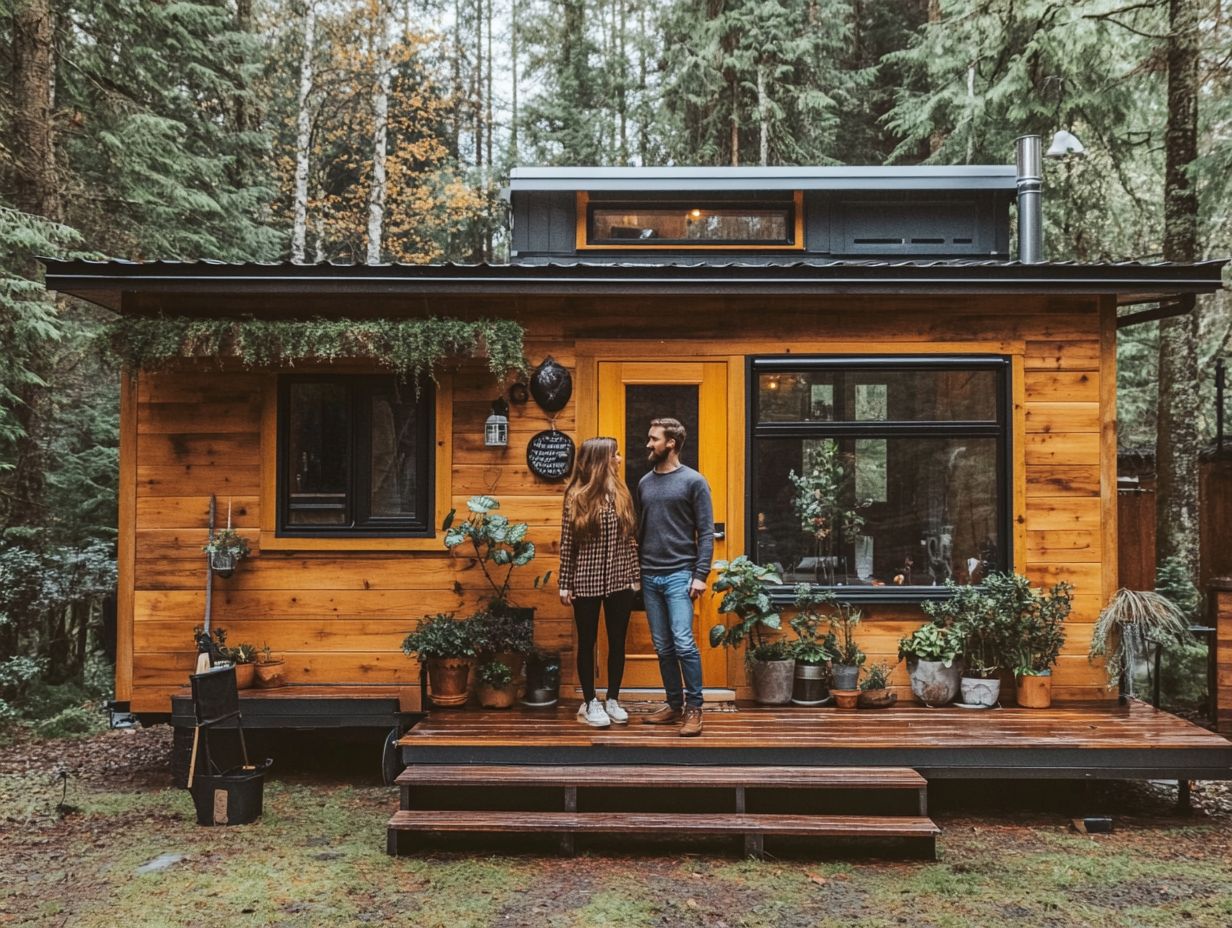
Effective communication and compromise are essential for navigating tiny house ownership. These tools help when legal complications arise that could impact your living situation.
Regular check-ins can strengthen your partnership. Discuss money issues, upcoming deadlines, or legal requirements openly and honestly.
Recognizing that compromise is vital can ease tensions. One of you might prioritize looks while the other focuses on usability.
By having respectful conversations and considering each other’s views, you can tackle tiny home challenges together. This will ultimately build a stronger partnership.
Alternative Living Options for Couples
Exploring alternative living options can provide creative solutions to financial stress. These solutions can enhance relationship dynamics in the tiny house community.
Beyond traditional tiny houses, there are various housing models designed for couples seeking unique solutions. These cater to different lifestyles and budgets.
Comparing Tiny Houses to Other Housing Options
When comparing tiny houses to other options, consider financial stress, moving challenges, and community aspects. Each choice has its advantages and disadvantages.
Tiny houses are celebrated for their sustainability and affordability. They offer a striking alternative to traditional homes and other living arrangements.
If you’re thinking about simplifying life, tiny living can help you save money. You can then spend your savings on experiences instead of things.
However, the tiny lifestyle requires a shift in terms of space and privacy. Balancing personal comfort with the appeal of minimalism is crucial.
Conventional apartments typically offer more amenities and a sense of community. But they may also come with financial limitations.
Communal living promotes social interaction and shared responsibilities. Yet, it might reduce individual freedom.
Each option can significantly affect your financial goals. So, think carefully about your decision-making process.
Frequently Asked Questions
1. Is it legal for couples to own a tiny house together?
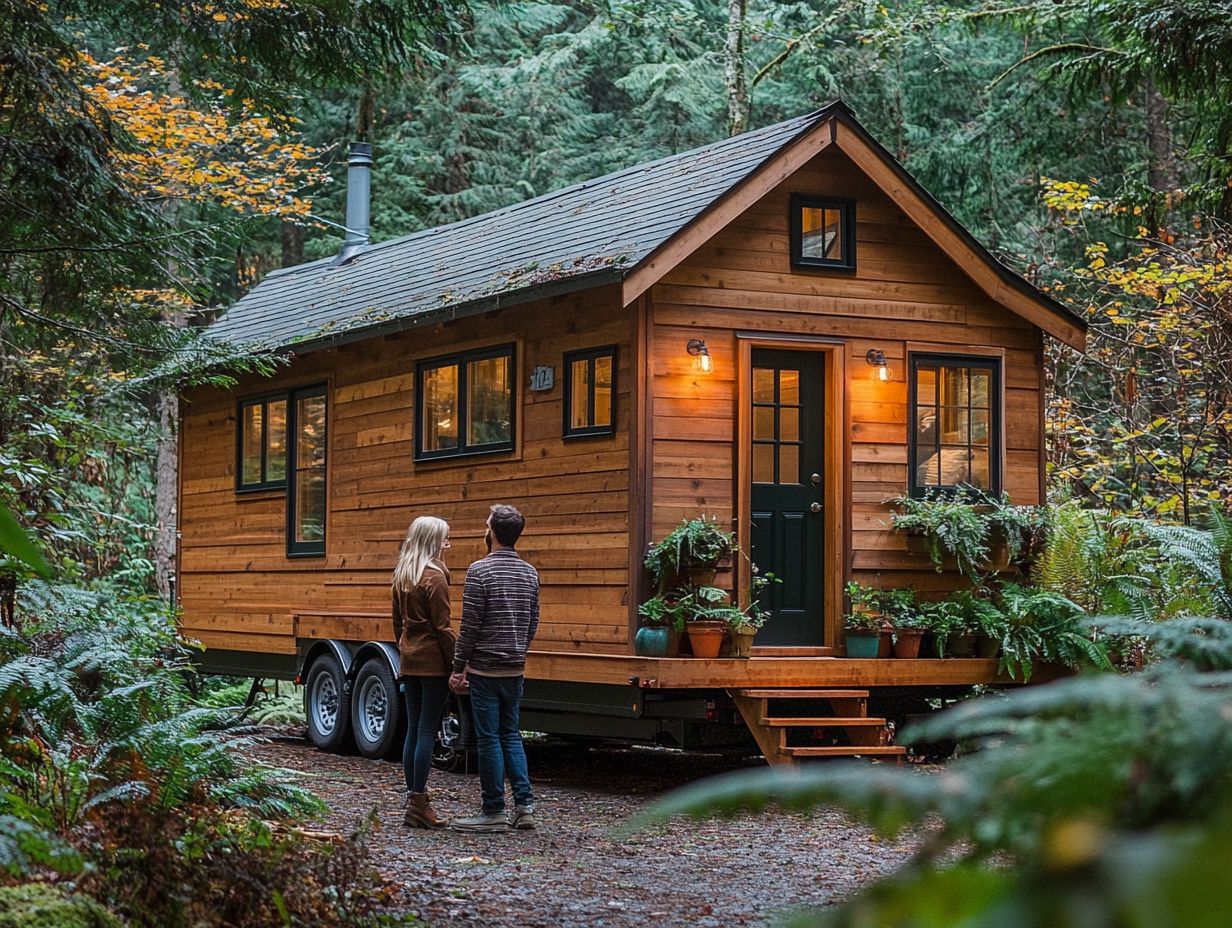
Yes, couples can legally own a tiny house together. Both must be able to enter into a contract to do so.
2. Do we need a special ownership agreement for our tiny house?
Yes, a written agreement is recommended. It outlines each person’s rights and responsibilities and how the property will be divided if needed.
3. Are there zoning or building code considerations for tiny houses owned by couples?
Yes, check local rules before buying or building a tiny house. Some areas may have restrictions or require permits for them to be a permanent home.
4. Can one person own the land while the other owns the tiny house on it?
Yes, this is possible. It should be clearly stated in a written agreement to avoid future issues.
5. Can couples use a tiny house as a primary residence?
Absolutely! Couples can live in a tiny house as their main home.
It’s crucial to check that it meets local building codes and regulations.
6. Are there any tax implications for owning a tiny house as a couple?
Yes, owning a tiny house might have tax consequences.
To navigate these implications, it’s wise to speak with a tax professional.

